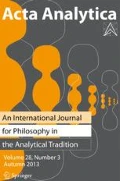Abstract
The paper offers some preliminary and rather unsystematic reflections about the question: Do Beliefs Have Their Contents Essentially? The question looks like it ought to be important, yet it is rarely discussed. Maybe that’s because content essentialism, i.e., the view that beliefs do have their contents essentially, is simply too obviously and trivially true to deserve much discussion. I sketch a common-sense argument that might be taken to show that content essentialism is indeed utterly obvious and/or trivial. Somewhat against this, I then point out that a “sexy” conclusion that is sometimes drawn from Putnam-Burge-style externalist arguments, namely that our mental states are not in our heads, presupposes content essentialism — which suggests that the view is not entirely trivial. Moreover, it seems intuitively that physicalists should reject the view: If beliefs are physical states, how could they have their propositional contents essentially? I distinguish three readings of the title question. Content essentialism does seem fairly obvious on the first two, but not so on the third. I argue that the common-sense argument mentioned earlier presupposes one of the first two readings but fails to apply to the third, on which ‘belief’ refers to belief-state tokens. That’s because ordinary belief individuation is silent about belief-state tokens. Token physicalists, I suggest, should indeed reject content essentialism about belief-state tokens. What about token dualists? One might think they ought to embrace content essentialism about belief-state tokens. I end with puzzling why this should be so.
Similar content being viewed by others
References
See Hilary Putnam: “The Meaning of Meaning”, inMind, Language, and Reality: Philosophical Papers, Vol. 2 (Cambridge: Cambridge University Press 1975), 215–71; Tyler Burge: “Individualism and the Mental”, in P. A. French, T. E. Uehling, and H. K. Wettstein, eds.,Midwest Studies in Philosophy, Vol. 4:Studies in Metaphysics (Minneapolis: University of Minnesota Press 1979), 73–121; Tyler Burge: “Other Bodies”, in A. Woodfield, ed.,Thought and Object: Essays on Intentionality (Oxford: Clarendon Press 1982), 97–120.
See, for example, p. 1 of McGinn’sMental Content (Oxford: Basil Blackwell 1989).
Cf. for example: Donald Davidson, “The Individuation of Events” (1969), reprinted inEssays on Actions and Events (Oxford: Clarendon Press 1982), 163–80; and Jaegwon Kim, “Events as Property Exemplifications” (1976), reprinted inSupervenience and Mind: Selected Philosophical Essays (Cambridge: Cambridge University Press 1993), 33–52.
See Horgan, “Humean Causation and Kim’s Theory of Events”,Canadian Journal of Philosophy 10 (1980), 663–79; cf. also Kim,op. cit., 43f.
Author information
Authors and Affiliations
Rights and permissions
About this article
Cite this article
David, M. Content essentialism. Acta Analytica 17, 103 (2002). https://doi.org/10.1007/BF03177510
Received:
DOI: https://doi.org/10.1007/BF03177510


